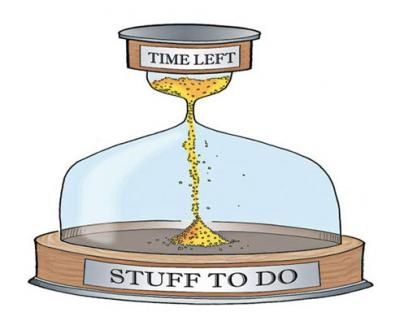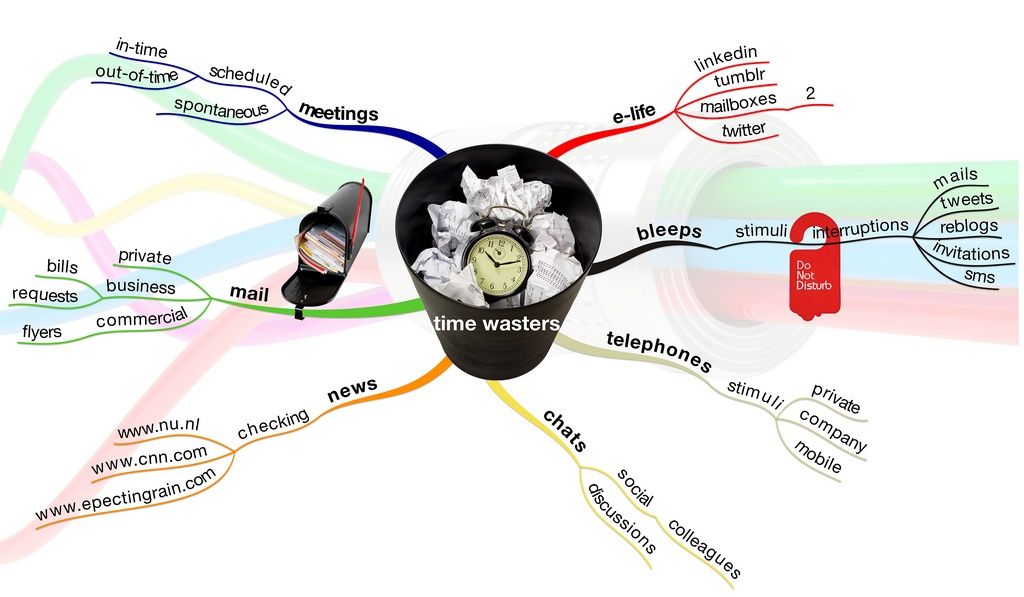Easy Ways to Manage Your Time Effectively
 Between work and home, there always seems to be an endless “to do” list, with everything needing to be done now! What do we have to give up just to have some time for ourselves? Wouldn’t we all like to have more hours in the day to get things done, or maybe just have less to do (wishful thinking).
Between work and home, there always seems to be an endless “to do” list, with everything needing to be done now! What do we have to give up just to have some time for ourselves? Wouldn’t we all like to have more hours in the day to get things done, or maybe just have less to do (wishful thinking).
Time management is about organizing and planning the time we devote to specific activities. Being busy isn’t the same as being effective. Understanding what to spend time doing and how to do that most efficiently will help us be more productive, ease stress and provide a healthy work-life balance.
Here are some easy tips to get started:
Do:
- Do keep tidy and organized
- Do prioritize
- Do be calm and keep things in perspective
Don’t:
- Don’t procrastinate
- Don’t try to multi-task
- Don’t give up
Keep a Daily Journal
A great place to start is by logging your time and activities for a week or so. Take a look at when you are most and least effective. Where possible, plan your day to accommodate your level of productivity. For example, many people tend to be less effective right after lunch. If that is the same for you, use that time to do less critical activities like checking email. If you’re a morning person, take advantage of that time to plan your day and do tasks that require you to be alert and productive.
Organize your Tasks
Lump similar tasks together and try to do them all at once. If you’re going to be doing paperwork, take care of it all at once to make best use of your time. Once you pick up a task, finish it if at all possible. One of the keys to being effective is to only touch something once. Unless it requires resources you don’t have available at that time, don’t pick up something and put it down unfinished.
Getting Around Obstacles
Even if we dutifully plan our schedule and make every effort to maintain the schedule, things come up that take us off course:
Interruptions - everything from emergencies to people just wanting to chat. Emergencies probably need to be addressed right away (although be sure it really is an emergency) but use your resources as available to minimize impact to your schedule. For non-emergencies, determine whether or not it's really urgent and ask people to schedule some time with you if needed.
Distractions - social media, checking the news, online shopping...there are plenty of things to distract us these days! Allow yourself some breaks throughout the day to catch up on your online life as well. Continually checking all day creates inefficiencies and distracts you from your planned tasks.
New tasks added - who hasn't experienced "schedule creep?!" Unplanned activities seem to happen nearly every day. Be patient and flexible; try negotiating the requirements if needed. See the priority matrix on the next page to figure out how to handle the new tasks: Do It—Delegate It—Decide When—Drop It
Tasks don't go as planned - again, a common issue. Try building in some flexibility to your schedule to accommodate changes to your plans. Keep a few quick activities available at any time to bring out in case you need to fill some time.
While we want to minimize obstacles, or at least handle them efficiently, make sure not to schedule yourself so tightly that you can't accommodate changes, as they are inevitable. Be realistic and plan for the unplanned!

Prioritization
Another tool we can use to evaluate priorities is to map out the importance and urgency of each task. By seeing tasks compared against others, we can decide which are more important to tackle first.
We also need to determine who performs each task, if at all. This can guide our decisions by informing which tasks need our attention, which can be delegate, or others that may not need to be done at all, at least not urgently.
If you’re the one being delegated a task, don’t necessarily assume it has to be done right away. Ask when the person needs the task completed.
For teachers, look for ways to use the resources you have available. Often you have more help available than you might think. Be sure to keep the classroom organized and plan for transitions. Keep on hand short, quick activities to fill the time when plans get changed.
Establish a Routine
Establishing routines can also help manage your time by keeping you on track and minimizing decision-making. Routines can create efficiencies since you're likely to refine the tasks after doing them many times. If nothing else, they become so familiar that you don't have to put much thought into performing them—save those brain cells for more important decisions! Once you set a schedule, maintain it as best you can but don’t try to control everything—be flexible when needed.
 Schedule "Me Time"
Schedule "Me Time"
Most importantly, to create a good work/life balance, set boundaries and be sure to make time for yourself. Don’t be afraid to put “me time” into your schedule. We all need time for ourselves as well and often don't get a chance until we specifically schedule it!
As part of your “me time,” invest in your own development and celebrate your accomplishments. Take time to learn something new, something you've always wanted to do or something that might help advance your career. Learning not only keeps our minds fresh, but also gives us inspiration and motivation. This can benefit you both personally and professionally, and it also helps to feel good about ourselves!
For more information, try our online classes:
Managing Your Time to Get Things Done
"The bad news is: time flies. The good news is: you're the pilot."